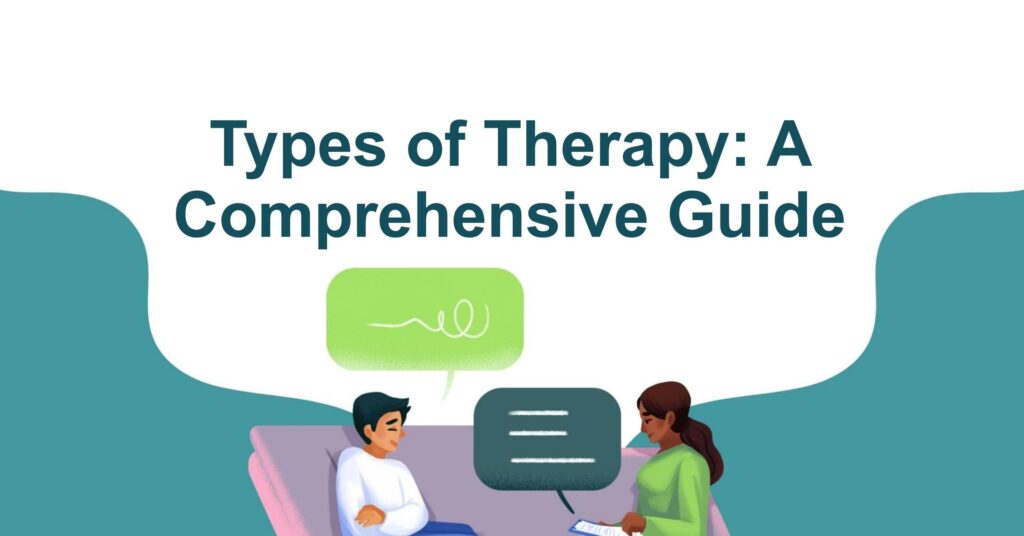Therapy is a valuable tool for individuals seeking emotional, mental, or psychological support. It provides a safe and confidential space to address personal challenges, enhance well-being, and foster personal growth. However, not all therapy is the same; there are various types of therapy tailored to different needs and preferences. In this blog, we’ll delve into the world of therapy and explore five different types, shedding light on what makes each unique and how they can benefit you.
Cognitive Behavioral Therapy (CBT) Can Help Rewire Your Thought Patterns
Cognitive Behavioral Therapy, commonly known as CBT, is a widely practiced and evidence-based form of therapy. It focuses on the connection between thoughts, feelings, and behaviors. The underlying principle of CBT is that our thoughts influence our emotions, which, in turn, impact our actions. People with degrees in therapy go through specialized training to learn how to implement CBT with their clients and patients.
In CBT sessions, you’ll work closely with a trained therapist to identify and challenge negative thought patterns or cognitive distortions. By recognizing and reframing these thoughts, you can change your emotional responses and, ultimately, your behavior. This approach is particularly effective for managing anxiety, depression, and other mood disorders.
Psychoanalysis and the Basics
Psychoanalysis, developed by Sigmund Freud, is often seen as the cornerstone of modern psychology. It delves deep into the unconscious mind to uncover repressed thoughts, feelings, and memories that may be influencing your present behavior and emotions.
Psychoanalytic therapy typically involves long-term, in-depth exploration of your past experiences and their impact on your current mental state. The goal is to bring these hidden aspects of your psyche to the surface, allowing you to gain insight and resolution. This type of therapy can be beneficial for individuals dealing with long-standing issues or seeking a profound understanding of themselves.
During psychoanalysis, you may discuss dreams, free associations, and childhood memories. It’s a bit like archaeological excavation of your mind, digging into layers of your history to uncover buried treasures of self-awareness.
Dialectical Behavior Therapy (DBT)
Dialectical Behavior Therapy, or DBT, is a specialized form of cognitive-behavioral therapy designed to help individuals struggling with emotional regulation, impulse control, and interpersonal relationships. DBT incorporates elements of mindfulness and acceptance, in addition to traditional CBT techniques.
It focuses on balancing acceptance and change, emphasizing the importance of recognizing and accepting your current emotional state while also working towards constructive change. This therapy is particularly effective for individuals with borderline personality disorder and those prone to self-destructive behaviors.
In DBT, you’ll learn practical skills for managing intense emotions, improving interpersonal communication, and tolerating distressing situations. These skills include mindfulness exercises, emotion regulation techniques, and interpersonal effectiveness strategies. DBT encourages you to find the middle ground between acceptance of yourself as you are and the desire to grow and change.
Humanistic Therapy
Humanistic therapy, also known as person-centered therapy, revolves around the belief that individuals possess an innate drive toward personal growth and self-actualization. This approach fosters a non-judgmental, empathetic, and supportive therapeutic relationship where the client can explore their own values, beliefs, and desires.
In humanistic therapy, you are seen as the expert on your own life, and the therapist’s role is to create a safe, empathetic space for self-exploration. Unlike some other forms of therapy, the humanistic approach doesn’t rely on specific techniques or interventions. Instead, it encourages you to tap into your inner resources and develop a greater understanding of yourself.
This therapy can be particularly beneficial if you’re seeking personal growth, self-discovery, or a deeper connection with your authentic self. It’s a journey towards becoming the best version of yourself, guided by the gentle hand of a supportive therapist.
Family Therapy Helps You Heal Together
Family therapy, as the name suggests, involves working with families or couples to improve communication, resolve conflicts, and foster healthier relationships. It recognizes that individual issues often have a ripple effect on the family unit and aims to address these dynamics.
One of the key principles of family therapy is that the family is viewed as a system, with its own patterns of interaction and communication. The therapist helps family members identify these patterns and understand how they contribute to problems within the family. By fostering open dialogue and empathy, family therapy seeks to improve family relationships and promote mutual understanding.
For example, in a family struggling with a teenager’s behavioral issues, family therapy might uncover that the parents’ communication style exacerbates the problem. By addressing the underlying family dynamics, the therapist can help the family members work together to support the teenager’s growth and development.






